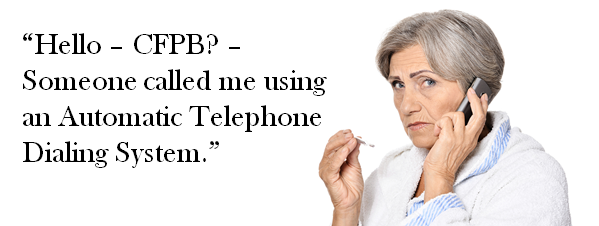
Even if your compliance procedures are technically correct, calling cell phones is a pretty big risk. In the eyes of the Consumer Financial Protection Bureau (CFPB), the consumer is generally always right—regarding the Telephone Consumer Protection Act (TCPA), anyway. So, if a consumer gets upset and complains to the CFPB about your cell phone calling practices—whether you feel you’re in the right or not—it could cause trouble for you and your business. And, with the recent FCC Declaratory Ruling definition of Automatic Telephone Dialing System vs Manual becoming even less clear, it appears call recipients (and their lawyers) have more ways than ever to sue telemarketers.
Given these uncertainties, it’s amazing how many B2C and—now especially—B2B companies don’t even scrub their calling list to identify and archive cell phone numbers. On Oct. 16, 2013, the TCPA regulations became “consumer agnostic,” meaning it doesn’t matter if a cell phone number is for business or pleasure. It’s a cell phone. That’s all that matters. See our blog: "Cell Phone Scrubbing Still Key to DNC TCPA Compliance."
Mobile phones are the new frontier, and scrubbing for them is the beginning of compliance whether you call them or not. Whether you call cells by hand, use an ATDS in “pause and preview mode,” call and hang up, call and leave a message, call and leave caller ID – it doesn’t matter if you haven’t identified them every 15 days.
Are You Making B2B Cell Phone Calls?
Virtually all B2B cell phone calls are made using some kind of auto-assisted dialing. Fast-moving tech and software companies are mining leads from third parties like LinkedIn and other social media sites. So, lots of calls are being made to these so-called “business cells.” Many B2B companies are unaware the laws changed last October and you can’t call cell phones—consumer or B2B—using any kind of auto-assisted dialing anymore. See our blog: "I only call other Businesses (B2B) - So I am Exempt from Cell Phone Compliance, Right?"
If you don’t have written permission to call, you’re out of luck, and predatory attorneys are starting to realize just how profitable that can be for them.
It’s Not Just B2B
Even B2C cell phone calls have become more problematic with the increased consumer awareness of companies violating their “private window to the world” (meaning, their cell phones) under any circumstances. I’ve had cell phone owners accuse me of being a telemarketer, saying they’re going to turn me in (whatever that means).
And I’m always amazed at how giddy the “How to Sue Your Debt Collector” sites get with their advice. Human beings just love the idea of getting someone else.
Not that solicitation companies don’t sometimes deserve hostile treatment for calling cells. Last week I had five hang-ups in a row after single rings on my cell. When I called back, it was a magazine solicitation recording. Did they totally disregard my private cell phone on purpose? I don’t know. But at the very least, they shouldn’t be so sloppy with their technology. And as a cell phone owner, I’m just more motivated to do what I can to fry anyone that messes with me!
In Summary
Even if you’re in the right, i.e., you feel you’re technically compliant when you start spinning that dialer, have proper permissions with auto-assistant or pre-recorded messaging, you want to ask yourself “Is this going to annoy the consumer?” That’s really what the authorities listen to and respond on. “Is this cell phone communication delivery method going to cause consumers to complain?” And the truth is, many ATDS calls do generate more complaints.
Whatever you choose to do on cells, however you choose to call them (or not), whatever secret compliance sauce you’ve got cooked up to contact consumers, scrub your calling list for cell phone numbers. See our page, "Are you scrubbing All the Cell Phones."

Yes, even if you’re B2B. Yes, even if you’re making political calls (as per the Autodialed and Prerecorded FCC Enforcement Advisory of September 2012).
Scrubbing should be done through a third-party Do Not Call Law Compliance Service Provider that can archive and certify each scrub, making sure all proper lists were consulted every 15 days and implemented properly.
Scrubbing your cells will go a long way in any TCPA altercation.






